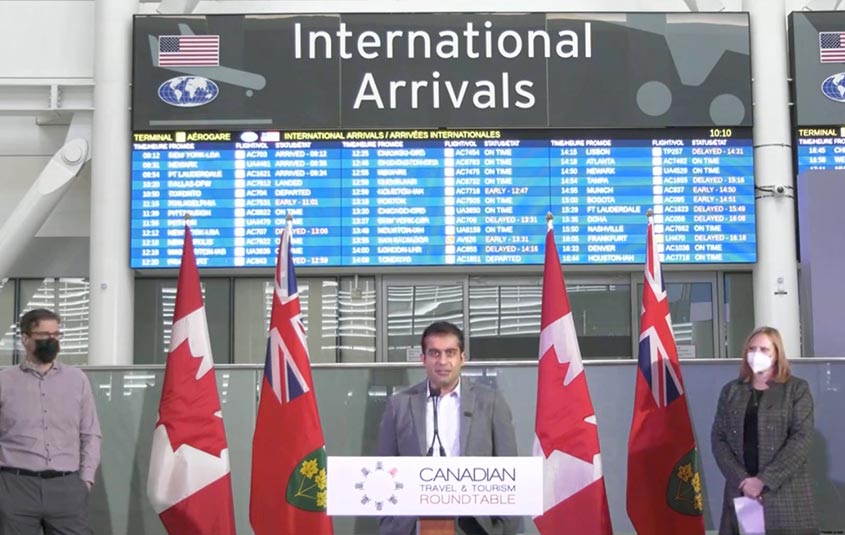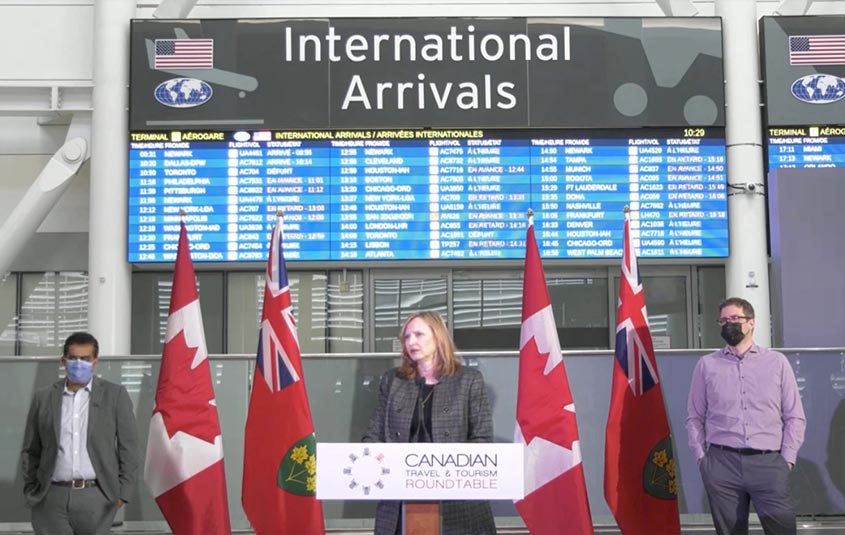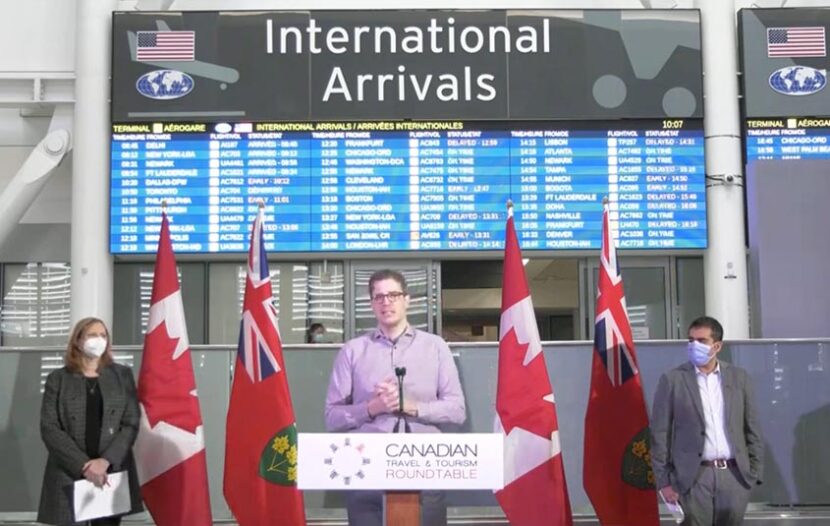TORONTO — With March Break in a matter of weeks, and high season summer travel just a few months away, The Canadian Travel and Tourism Roundtable is stepping up its calls for easing restrictions on international travel.
At a press conference this morning at Toronto’s Pearson Airport, two doctors – Dr. Dominik Mertz, Medical Director of Infection Control, at Hamilton, ON’s McMaster University, and Dr. Zain Chagla, Medical Director, Infection Control at St. Joseph’s Healthcare – joined TIAC President Beth Potter to call on the federal government to remove unnecessary and non-science-based obstacles to international travel.
Specifically, the Roundtable is calling for the elimination of pre-departure and on-arrival PCR tests for fully vaccinated travellers.
Dr. Chagla summed up the situation perfectly. He noted that while the federal government is spending reportedly hundreds of millions of dollars on contracts for PCR testing for asymptomatic and fully vaccinated travellers arriving in Canada, the severe lack and lag times with PCR testing in Canada’s communities means that symptomatic Canadians testing positive on a rapid antigen test in their own home towns and cities can’t even get a PCR test to confirm their diagnosis.

Dr. Zain Chagla, Medical Director, Infection Control, St. Joseph’s Healthcare
Add to that the fact that the omicron variant is now so widespread at this point – up to 50% of the global population may contract COVID-19 by the end of March, according to one study – that the hyper-focus of testing international travellers and returning Canadians is like closing the proverbial barn door after the horse is already out.
“The way we deal with travel needs to change,” says Dr. Chagla.
Taking the province of Ontario as an example, Dr. Chagla said: “There are credible estimates from the Ontario Science Advisory Table suggesting that 1.5 to 4 million Ontarians were infected [with COVID-19] over the last two months. When 10 – 30% of your local population already got COVID-19 over the last two months, really, it becomes a little bit futile to try to prevent it coming over the border.”
There is going to be a COVID risk with travelling, “but there’s going to be an equal risk the second you leave the airport and you go back home and into a high-risk setting.”
Dr. Chagla used another relatable example: a live sports event. “We have to fundamentally think about what the point of testing is for travellers. We may be able to go to a Raptors game in the next couple of weeks. Certainly we went before the omicron wave. There’s no requirement to be tested going into a stadium with 10,000 or 20,000 individuals for four to six hours. So why do we impose a test for someone who wants to fly to New York, when they’re in a well-ventilated [airplane] and wearing a mask?”
Dr. Chagla also pointed out inconsistencies with isolation timelines. Someone who tests positive on an antigen test is told to assume they are positive and to isolate for 5 days, however travellers are often waiting more than 5 days just to get the results from their on-arrival PCR tests due to delays.
He also notes that many people continue to test positive for COVID-19 for months after infection, and often have no proof of COVID diagnosis due to lack of PCR testing lab capabilities here in Canada. “They may not be infectious, but if they test positive in destination, that’s a cost, that’s isolation, and all for what?”
“REALISTICALLY, CANADA WILL NOT ELIMINATE COVID-19″
Canada has been dealing with COVID-19 for close to two years now, and “we know this virus now,” said Dr. Mertz. “Restrictions are justified when you’re facing an unknown pathogen, an unknown virus, and that’s the situation we had two years ago, when we were trying to keep this virus away, trying to isolate it in China, which turned out to be futile.”
Travel restrictions at their core are a zero-COVID strategy, “but Canada has not and realistically will not eliminate COVID-19. And Canada and the rest of the world will transition step by step into endemicity.”
Dr. Mertz also noted that less than 1% of Canada’s cases of COVID-19 have been associated with international travel. “Of course, this would have been higher if there were no restrictions or testing. But when you’re looking at what’s happening around us with community transmission, it’s extremely unlikely that the travellers that come in potentially positive will have any sizeable effect on transmission.”

Beth Potter, President, TIAC
DEVASTATING IMPACT ON INDUSTRY
TIAC’s Beth Potter ended the conference with a sobering stat from Canadian tourism sector: “Our industry is half of what it was in 2019.”
She added: “It’s going to take a long time for us to rebuild. Our workforce has taken an absolute hit.”
As for March Break travel – as the industry knows but the public and governments may forget – the booking window is now, says Potter.

